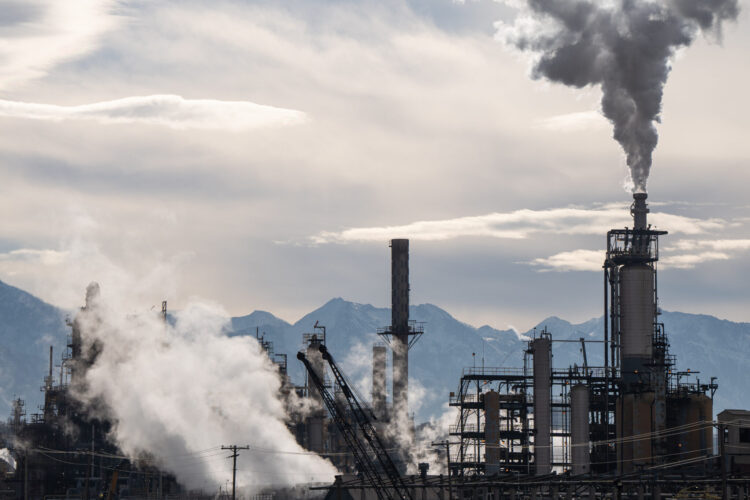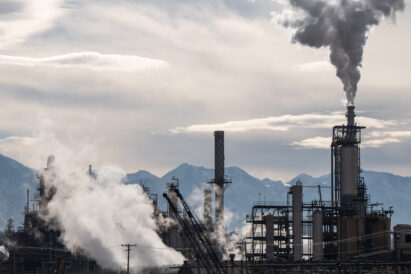Lawmakers want to lower Utah gas prices next year — here’s their proposal
Removing a tax break could help lower the state’s tax on gas by 25% to 50%, lawmakers say. But the oil industry warns about other financial consequences

Photo by Spenser Heaps for Utah News Dispatch
Marathon Petroleum Company’s refinery in Salt Lake City is pictured on Wednesday, Jan. 3, 2024.Last summer, on his way to the Rich County rodeo, Utah House Speaker Mike Schultz stopped at a gas station in Evanston, Wyoming. Taking the out-of-state route allowed him to do two things — to buy a couple of lottery tickets, which are banned in Utah, and fill up his gas tank while saving 26 cents per gallon.
The gas price disparity across state lines had been on his mind before then, he said in a social media post in August, where he hinted at a legislative proposal to help find a relief.
“A big reason is that Utah refineries produce up to 220,000 barrels a day, but about 75,000 of those are shipped out of state to meet demand elsewhere in the West–pushing our prices higher here at home,” Schultz wrote then.
A few months have passed since that post, and more details about the plan Schultz has worked on alongside Rep. Cal Roberts, R-Draper, and Sen. Brady Brammer, R-Highland, have emerged. It has to do with a longstanding tax practice for fuel exported out of state.
Currently, Utah has a $0.385 tax rate per gallon for motor fuel sold at gas pumps in the state, but has an exemption for fuel exported out of state.
A draft bill is still in the works, Roberts said, and may be introduced during the 2026 legislative session to, essentially, reassess the state’s gas tax structure.
“The idea would be, we’re going to remove that tax exemption, that special tax break that they get for (the) product that leaves the state, and we’re going to tax all fuel the same,” Roberts said. “And then by doing that, we’re going to be able to lower the gas tax for Utahns at the pump.”
How so?
By also lowering that $0.385 tax rate that Utahns pay for fuel.
Removing the tax exemption would have an impact on Utah refineries’ ability to export their product out of state, Roberts said. “But you’re going to create enough revenue where you can drop the gas tax for Utahns in the state. And I think we’re looking at dropping the gas tax 25% to 50%.”
That would translate to a price reduction of 10 to 20 cents per gallon, he added.
Since the bill language isn’t yet public, the Utah Petroleum Association didn’t have much to say about its position; however, Rikki Hrenko-Browning, president of the group, said in a prepared statement that “altering the state’s gas tax and other related taxes will have significant financial implications for the state of Utah. Until we have bill language that clearly lays out what the legislature wants to do, we won’t speculate on what the exact nature of those impacts will be.”
The association remains committed to conversations with lawmakers to share potential impacts on any proposals they may pursue, she added.
Regional pricing
According to the American Automobile Association, as of Thursday, the average gas price in Utah was $3.31 a gallon, over the $3.07 national average.
In neighboring Wyoming, that’s normally cheaper with an average of $2.97 per gallon reported Thursday. Meanwhile, Colorado saw a $2.93 average. However, other surrounding states had higher gas prices on the same day. Idaho reported an average of $3.42 a gallon; Nevada had $3.80 and Arizona, $3.36.
Roberts pointed to rural bordering counties, like San Juan in southeastern Utah, which had a $3.49 average per gallon on Thursday, while Montezuma in southwestern Colorado reported an average of $2.95.
He argued that while Utah produces more gas than it consumes, prices aren’t competitive because of regional market influences.
As other Western states like California move away from fossil fuels, leading refineries to shut down, Utah’s oil production grew 13% to 65.1 million barrels in 2024, the highest annual production on record, according to the Kem C. Gardner Policy Institute.
“When supply goes down, or supply is not as much, what happens to price? Price goes up,” Roberts said. “And those higher prices in Nevada, California, Washington, Oregon, they’ve had a vacuum effect, where they’ve sucked barrels out of our state, because our refineries are chasing the higher margins of these other states, and it’s increasing our prices.”
Industry pushback
An anonymous petition is circulating online opposing the proposal, arguing that “there’s no proof this would actually lower prices for Utah drivers–but it would create new costs and red tape for the energy producers who power our state.”
The refining industry, the petition says, is already dealing with global instability, market pressures and other regulatory burdens. “The last thing we need is more government interference in an industry that keeps Utah running,” petitioners wrote.
Schultz responded to that request with an eye-rolling emoji, saying the legislative proposal would shift the tax burden off Utahns and onto oil refiners.
“These are some of the largest companies in Utah, and the world, and they’ve fought for decades to avoid paying their fair share, all while Utah families face some of the highest gas prices in the country,” Schultz wrote in a post.
Roberts is on the same page.
While he’s happy the refineries are doing well and help keep prices relatively low, he believes they get a lot of tax breaks that are paid by Utahns.
“We think it’s fair to Utahns to re-examine those tax breaks and those tax exemptions that these guys are enjoying,” Roberts said, “and then using some of that to lower the gas tax at the pump for Utahns.”



